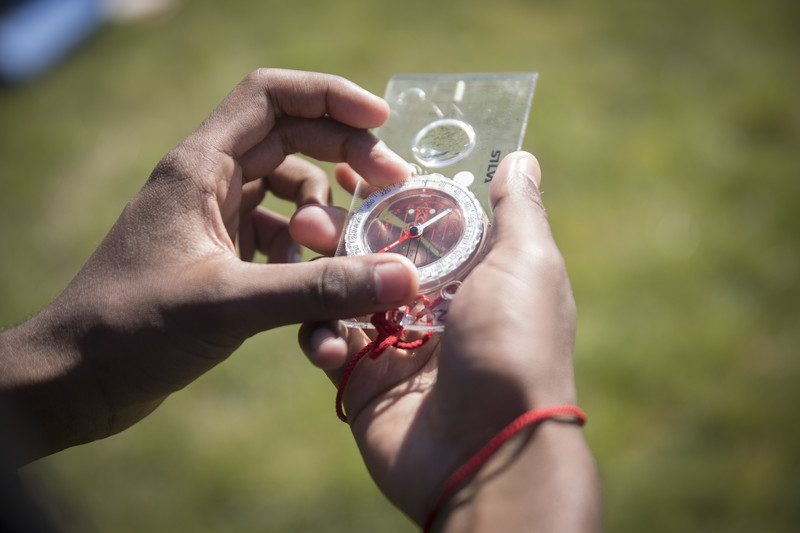An exciting, varied and self-sufficient bushcraft expedition for Silver Award Girlguiding participants

We spoke with one of Girlguiding’s DofE Leaders in Central England about how they ran their expeditions with a difference.
1. What were the expedition aims?
The aim of the expedition was ‘Living with Nature – a bushcraft experience’. Within this aim each team had a slightly different focus – one team focused on wildlife and nature on the site, and the other on the natural world such as the plants and trees. Participants commented that they had really enjoyed being out in the woods for the expedition and that they had learnt a huge amount about the local wildlife and environment. They particularly enjoyed choosing aims that allowed them to give something back to nature.
2. What did the expedition look like?
The Silver training and practice expedition took place over the May bank-holiday weekend – it was non-residential due to Covid restrictions at the time.
Training day:
- Safety briefing
- Safe use of tools – axes, bow saws and hand saws, bushcraft knives
- Lighting and constructing a fire
- Building a fire for cooking on and controlling heat
- Building a shelter for living space
Practice expedition – day one:
- Construct shelter
- Foraging walk to find kindling, tinder, wood and nettles for string
- Check for signs of wildlife on site
- Prepare lunch cooking on a fire – no utensils or pots
- Tree identification on site
- Cutting and chopping wood to size for fires
- Set animal footprints traps
- Evening meal preparation and cooking on open fire
Practice expedition – day two:
- Foraging walk to replenish wood, tinder and kindling
- Chopping wood and sawing to size
- Use of charcoal
- Cooking a three-course meal on an open fire, using Dutch ovens
- Confirming areas of the site requiring undergrowth clearance
- Dismantle shelters and clear site
The Silver qualifying expedition took place at the end July. Teams slept in pod shelters for one night and in hammocks for the other.
Qualifying expedition – day one:
|
|
|
Team 1:
|
Team 2:
|
Qualifying expedition – day two:
Weather – sunshine and light showers
|
Team 1:
|
Team 2:
|
Qualifying expedition – day three:
Weather – sunshine and intermittent heavy showers
|
Team 1
|
Team 2
|
3. What did you need to consider to organise and lead this expedition?
“In organising a bushcraft expedition, we needed to ensure that we had sufficiently competent staff to instruct in all areas of bushcraft, but also to ensure the safety of the teams regardless of any potential weather conditions. We had one supervisor per team, and a single Assessor for both teams. Due to our risk assessment one adult always remained on site.”
Where possible supervision remained hands-off and the supervisors stayed away from the bushcraft area of the site, allowing participants to have autonomy to get on with the expedition. During the practice expedition a greater level of supervision was employed to ensure that the participants were all competent and confident in handling sharp tools.
“The preparation probably took longer as this expedition was heavy on equipment requirements, and there was a greater amount of equipment needed than for a standard expedition. The equipment was also bulky and heavy requiring more effort to move around the site.”
“Following the practice expedition, participants designed their own programme for the qualifying expedition, and we had met online with them the week before for the Assessor’s pre-expedition check. This allowed us to flesh out more details of their planned activities. For future expeditions we would try and give participants more structure around planning these activities, and possibly include a simple chart.”

Two participants were able to take part in the bushcraft expeditions who felt that a ‘traditional’ walking expedition wasn’t for them. One participant has a congenital heart condition and struggles with highly physical activities and another participant requires access to a bathroom at least every two hours. Due to the nature of the bushcraft expeditions, both participants were able to take part safely and without disproportionate emphasis being placed on their medical conditions.
4. As a Leader, what did you notice about the outcomes for participants doing this expedition?
“At the start of the planning process when we offered this to the girls, there was a reluctance from some of them to sign up for this type of expedition as they felt that it wouldn’t be a ‘proper’ expedition.”
At the Assessor’s debrief, participants commented:
– “It was harder than a walking expedition.”
– “It was brilliant to have much better food that we had to cook ourselves from scratch.”
– “We had to use our brains all the time and had to be planning ahead and thinking for ourselves rather than just walking.”
– “It felt more like my own expedition rather than just planning to walk somewhere.”
Overall, the DofE Leader told us that this expedition was a brilliant DofE and life experience for the young people involved. This sentiment can be summed up by one participant who commented:
“We have had to be so much more flexible on this expedition, but I have had to think more, and I feel I have had control of my own expedition. I have learnt loads of new skills which are transferrable to home and I am really proud of what we achieved.”




